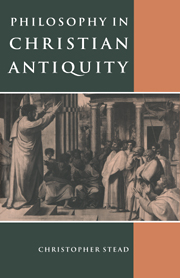Book contents
- Frontmatter
- Contents
- Preface
- List of abbreviations
- PART I THE PHILOSOPHICAL BACKGROUND
- 1 From the beginnings to Socrates
- 2 Socrates and the Platonic Forms
- 3 The philosophy of Plato's maturity
- 4 Aristotle
- 5 Epicurus and the Stoics
- 6 The Middle Platonists and Philo of Alexandria
- 7 The philosophy of late antiquity
- PART II THE USE OF PHILOSOPHY IN CHRISTIAN THEOLOGY
- PART III AUGUSTINE
- Bibliography
- Index of Names
- Index of Subjects
- Frontmatter
- Contents
- Preface
- List of abbreviations
- PART I THE PHILOSOPHICAL BACKGROUND
- 1 From the beginnings to Socrates
- 2 Socrates and the Platonic Forms
- 3 The philosophy of Plato's maturity
- 4 Aristotle
- 5 Epicurus and the Stoics
- 6 The Middle Platonists and Philo of Alexandria
- 7 The philosophy of late antiquity
- PART II THE USE OF PHILOSOPHY IN CHRISTIAN THEOLOGY
- PART III AUGUSTINE
- Bibliography
- Index of Names
- Index of Subjects
Summary
Plato's most important pupils were his nephew Speusippus, who succeeded him as head of the Academy on his death in 347; Xenocrates, who followed Speusippus, 339–314; and Aristotle, who broke away from Plato's influence and after spending a period away from Athens returned in 335 to found a school of his own, the Lyceum. Meanwhile he had acted as tutor to the young Alexander the Great. On Alexander's death in 323 an anti-Macedonian movement in Athens induced him to leave the city, and he died the next year.
Aristotle's influence on Western thought can hardly be exaggerated; but he was not a major influence on Christianity during its first four centuries, and for that reason will be rather briefly treated here. Indeed the scope and originality of his thought were not generally appreciated for several centuries after his death. The reasons for this change of fortune can be found in the history of his writings.
The works which were accessible to early Christians and other non-specialist enquirers were in the main those which he called his ‘exoteric’ or popular writings, which though lacking Plato's literary genius were carefully written to appeal to the general reader. These works have not survived, though to some extent they can be reconstructed from surviving fragments. It appears that they were written early in life, while Plato's influence was still powerful, and that they take an idealistic view of the aims of philosophy, besides showing signs of personal religious feeling.
- Type
- Chapter
- Information
- Philosophy in Christian Antiquity , pp. 31 - 39Publisher: Cambridge University PressPrint publication year: 1994

